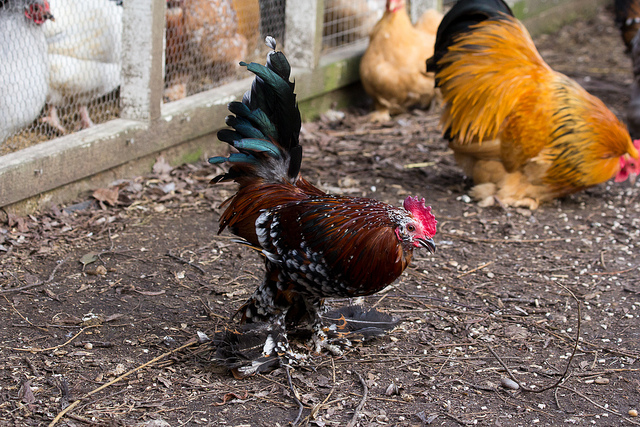There are a few simple things that you can do in order to ensure that your chickens are protected.
1. Install an automatic pop door
A sliding pop door is a DIY project that can be made with the help of an electric motor and timer, or it can be purchased and installed rather easily. Using a timer to regulate the door opening and closing can be tricky if your birds free-range, as the length of each day changes dramatically and a bird closed out of the coop certainly will draw predators. If constructing your own door, including a bottom rail will hinder some types of predators from lifting the door and helping themselves to your flock.
2. Upgrade your locks
A few predators, raccoons in particular, are skilled at opening doors and lifting latches. This could pose a problem for the inhabitants of your coop. Upgrade the latches and locks on your coop by including multistep latches and even padlocks to deter the most-skilled predators.
3. Replace chicken wire
Chicken wire is fine for some projects, but it is not the best option for protecting your flock. Replace the chicken wire in windows, screen doors and the run with hardware cloth. This cloth is a sturdy mesh that allows air to flow through easily while making it difficult for predators to tear. It also can be used as a covering for a run to deter hawks and owls from sampling your chickens.
4. Bury the fencing
Bury at least 12 inches of fencing below the surface to prevent burrowing animals from entering the run, but do it with the proper materials.
Uncoated metal, such as chicken wire, deteriorates quickly. When burying fencing for a chicken run, or as a protective measure around the coop, use coated metal below the surface. Chicken wire can deteriorate in as little as three years when exposed to the constant moisture typically found in the soil.
5. Keep it clean
Cleaning the coop is certainly necessary to maintain healthy chickens, but keeping the area surrounding the coop clean is just as important to their safety. At dusk, remove uneaten food and treats from the run and coop. This will discourage predators looking for an easy meal — and rodents that can spread disease — from entering the coop. Remove tall grasses, vines and other debris from around the coop, as well. Predators will be less inclined to stroll out to the coop when they will be in full view.
6. Perform regular maintenance
Small creatures, such as weasels, snakes and young opossums, can squeeze through very small holes. Replace worn or rotten boards promptly, including floor boards. Also, take care that the seams are properly fitted together, using a sealant to ensure there are no gaps for predators to slide through. Mend or replace fencing or hardware cloth that has been damaged.
Most of these preventative measures are either a part of the routine or at the very least should be moving forward!
Do you have some sure-fire ways to protect your chickens? Please let us know in the comments below.
Source: Off The Grid News

Shannon Nolen
I keep a light on at all times inside my large coop. The chickens stay near it at night. As long as it is on, the other critters stay out.